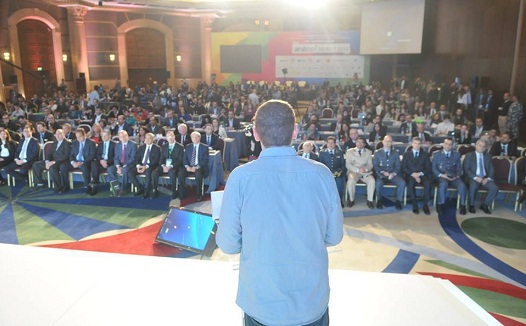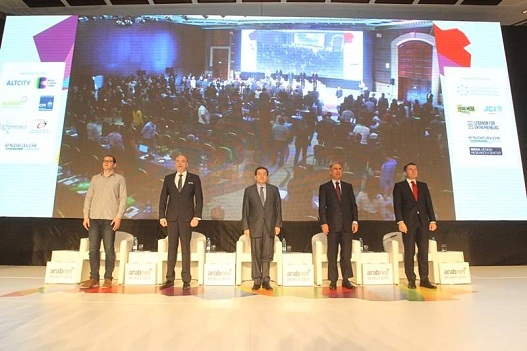Maker Movement and fintech: what to expect at Arabnet Beirut


Christidis speaking at Arabnet Beirut 2015. (Image via Arabnet)
The maker movement has been heating up in Lebanon for the past few years, and Arabnet Beirut 2016 plans to make the most out of this trend.
With over 1,200 attendees expected, and a lineup of 66 international speakers, including prominent makers such as Axelspace’s Lucas Brémond, PUSH Wearables’ Rami Alhamad and and international maker and founder of Rapid Manufactory Guillome Credoz, there is very much a maker focus.
Arabnet CEO Omar Christidis sat down with Wamda to talk about this year’s new introductions to Beirut’s “longest running digital gathering”, what attendees should look forward to, and how he thinks the Lebanese ecosystem has changed over the past few years.
The makers
A new element this year is the Makerspace Movement platform, a venue that will host discussion panels, exhibitions and a makers’ competition called Innovation Avenue. Hardware enthusiasts will have the chance to exhibit their products alongside accomplished entrepreneurs, and to participate in a hands-on coding experience.
“We’ve noticed since last year that the makers’ movement has gained a lot of momentum, and we wanted to focus on it, because our Beirut events often look at innovation at the grass-root level,” Christidis said. “As opposed to Dubai for example, which is significantly more corporate and enterprise focused.”
The Makers Movement will host a number of prominent hardware entrepreneurs, such as Lucas Brémond, space systems engineer at Axelspace, Rami Alhamad, CEO of PUSH Wearables and Ali Ismail, cofounder of FikraSpace.
“One of the topics the speakers will [discuss] is building the maker culture in schools, and what it takes to build the next generation of innovators,” said Christidis.

The national anthem is sung at the commencement of every annual Arabnet event. (Image via Ultgate)
Next: fintech innovation and the media industry
While previous editions of Arabnet Beirut have focused on digital banking and online payment services, this year’s edition plans to look at how banks can foster innovation themselves and enter the fintech market.
“Banking has always been a pillar of the Lebanese economy, and we’ve always had a focus on digital banking in Arabnet Beirut,” said Christidis. “This year, we will be asking: ‘How can Lebanon be a fintech hub as well, aside from its online banking initiatives?’”

A snapshot of Arabnet Beirut 2014. (Image via Lebanese Examiner)
Speakers from Barclays bank, one of the first banks to launch a fintech accelerator globally, will be present to discuss their own experiences and challenges with the attendees. “In my opinion, Lebanon has all the component of being a leader in Fintech, and I would like to see that happen,” said Christidis.
“The media sector is more heavily engaged this year,” said Christidis. “We’re having television, radio, and multimedia companies talk about the media industry in Lebanon.”
Speakers include Tarek Dajani, founder and CEO of regional branding agency Cleartag, Waseem Afzal, head of digital at Omnicom Media Group (OMD) and Rudy Banholzer, partner and managing director at Your Social ME.
Any challenges in Beirut?
Even though Arabnet Beirut has been going strong for several years, Christidis admits that the event comes with its own challenges, particularly when it comes to the speakers. “Speakers usually tend to get more excited about the larger [events] of Arabnet, as they prefer to speak in bigger markets,” said Christidis. “But we have doubled and tripled our efforts to leverage on what Lebanon has strength in, in it’s ecosystem, and we have proven ourselves in that.” Christidis did add that a number of senior executives do request to attend every event.
As for competition, Christidis is not worried.
“Many of our competitors have moved towards a mass model, where they are really focused on building the biggest digital event in the Middle East, but we’re not focused on that,” he said. Instead, his focus is to keep on providing access to keynote speakers and decision makers of the ecosystem. “And anyway the digital ecosystem is growing way faster than the events, so there are a lot of opportunities to capture.”
How does he think Arabnet Beirut will change in the future?
“I would like to continue leveraging the strength of Lebanon in our Beirut [events]. That will not change,” he said. These strengths include financial services, media industry and the Lebanese diaspora. As for other things, “it’s tough to predict what the trends will be, but it’s our job to stay on top of them, no matter what they are.”


